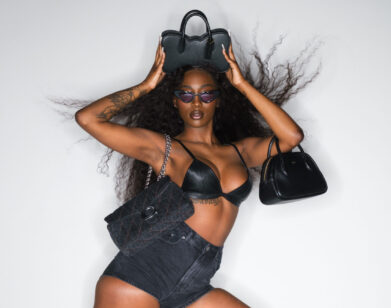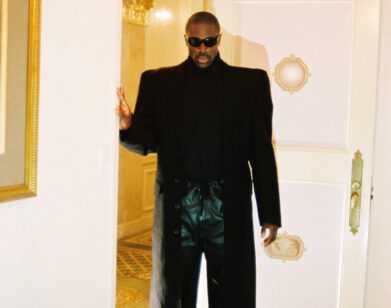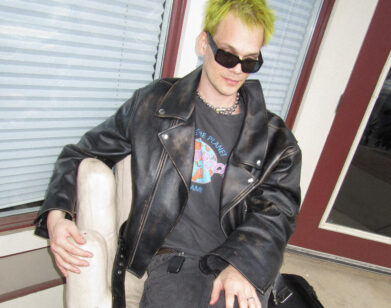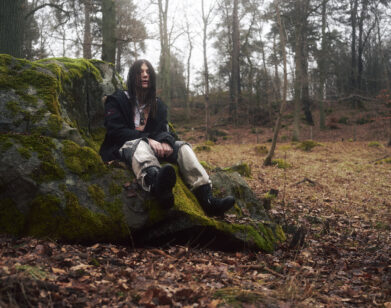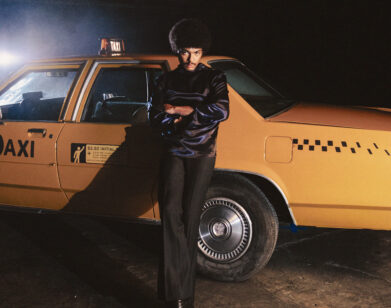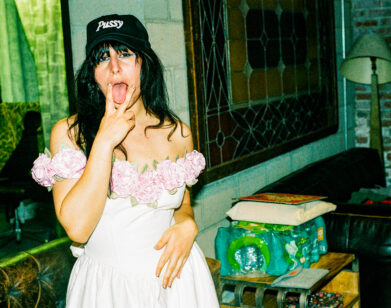Performance Art: Rob Delaney Interviews John Darnielle
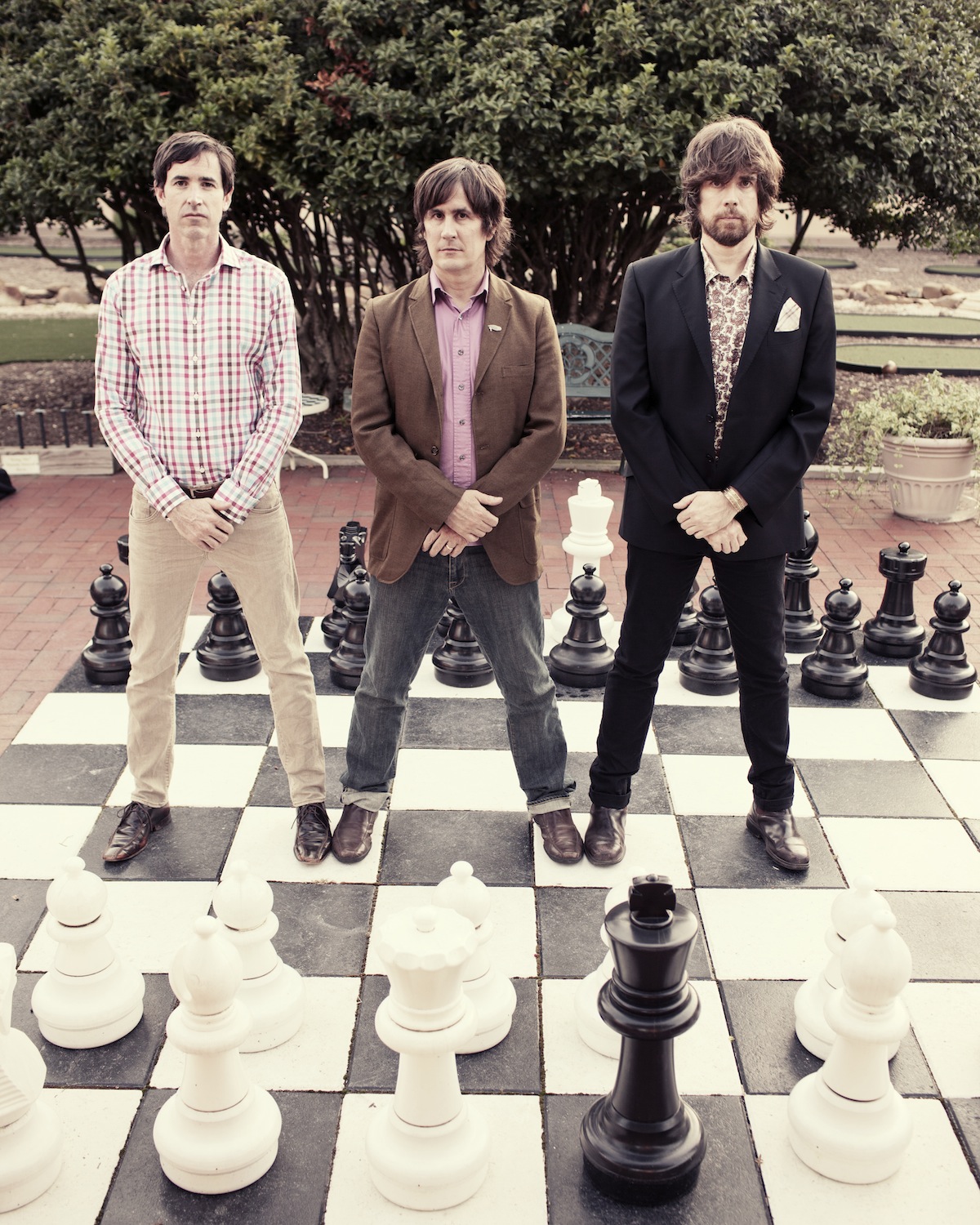
ABOVE: JOHN DARNIELLE (CENTER) WITH HIS MOUNTAIN GOATS BANDMATES. IMAGE COURTESY OF DL ANDERSON
If John Darnielle didn’t take the time to reinvent himself, the Mountain Goats would be a very different band today—and Darnielle, a remarkably different person. “I was working at a city hospital, and I felt old. I started to strike that pose as someone who was 40, and,” he says, laughing, “you have the world by the balls. At 23, you can completely, literally reinvent yourself, if you want to.” And reinvent Darnielle did; he attended college a year later to pursue a degree in English writing, and in his down time, recorded songs on a boombox. That was 1991.
Since then, Darnielle, 45, has made a career of turning trauma—both real and imagined—into a visceral, spellbinding form of musical storytelling. Whether channeling the demons of his whisky-soaked teenage years (“This Year”) or owning the desolate pleas of a video game character (“Thank You Mario! But Our Princess is in Another Castle”), Darnielle exhales each word with a gasp, singing as though each line could be his last. “I still can’t manage to keep a journal, and people have been telling me to since the fourth grade,” he remarks. “But that’s the thing. There’s the dual challenge of wanting to speak from an authentic place, and then being able to be honest about it. Even in the most mannered art, I think that’s what people value, is a voice that comes from a real place.”
Transcendental Youth, out this week via Merge Records, stems from the grand tradition of Darnielle’s earlier works, offering stories both autobiographical and borrowed. “I always assumed people wanted to hear me tell stories,” says Darnielle, “but then I had The Sunset Tree. It turned out, my own stories were the ones that registered with people the hardest. It’s hard for me to accept!” It’s difficult to glance at the grim cover art of Youth, or consider the devastating nature of Darnielle’s art, and not be surprised by the cheerful, spunky individual that he is away from the stage.
Recently Darnielle hopped onto Twitter, revealing a side of himself often overlooked by fans: for someone who makes a living making others cry, he really loves to laugh. In setting up this interview, we reached out to Darnielle’s real-life friend and fellow Twitter sage, LA comedian Rob Delaney, who swiftly accepted our proposition. (“Holy Christ above, Mountain Goats is following me!” he fondly recalls of their first online exchange.) Delaney caught up with Darnielle at home in Durham, North Carolina, and the two discussed suicide, fatherhood, adoption, dance, improvising, and digital high-fives.
JOHN TAYLOR: Should we begin this conversation with a Twitter hashtag?
JOHN DARNIELLE: I kind of got out of the habit of hashtagging—my tags are rusty. Rob, you sound like you’re underwater right now.
ROB DELANEY: Oh, man. Is this any better?
DARNIELLE: Much better. Above water.
DELANEY: JT, you’re recording this, so JD and I can just go?
TAYLOR: Green light!
DELANEY: I have a serious question for you, JD, which is, on your second most recent album [All Eternals Deck], I noticed a lot of mask imagery. And, we talked a little bit about the album The Blue Mask by Lou Reed when we had dinner in North Carolina. Tell me, why are masks something that you’re talking about these days?
DARNIELLE: It’s funny, because I tend to do a lot of mental health talk anyway, so I’m going to go straight into some therapy-speak. Much of my life, I’ve struggled with this idea of whether I even had a “real” self—maybe I was just this long sequence of masks that I put on for various audiences.
DELANEY: Sure.
DARNIELLE: Accepting that work is therapeutic has been a long journey for me. You talk about your sobriety, did you start performing before you were sober?
DELANEY: I was performing, but I thought I would just be an actor. Then I had the car accident, and said, “Now I’m going to do comedy.”
DARNIELLE: I love how your first act as a comic was to get in a car accident.
DELANEY: [laughs] Yes, that was my opening salvo. That’s the overture…
DARNIELLE: Exactly. It’s a big splash. A lot of people don’t know how to make that first big splash.
DELANEY: Okay, so let’s go deeper. And, this is upsetting for me to even bring up, but [we] mentioned David Foster Wallace, who hanged himself. It’s interesting, because suicide is something I’ve considered in the past.
DARNIELLE: Me, too. I spent a lot of time assuming I would die by my own hand.
DELANEY: When [Wallace] committed suicide, I was very angry. I understood it, because I understand those voices that tell you to do that. I imagine you and me, shoulder to shoulder, fighting—our weapons love and compassion. But it is a fight, and when someone like [Wallace] does something like that, it makes me realize the severity of what we’re fighting. And, it just personally makes me want to hug you.
DARNIELLE: I don’t know if I told you this, but one of the guys who I used to get high with, he previously owned David Foster Wallace’s house.
DELANEY: Oh, wow.
DARNIELLE: I was in the middle of a huge crisis less than a year after Wallace died, and I called my former junkie friend—who is now an addictions counselor—to ask him whether, maybe, if I needed to go back on the program. It was the summer of 2008, and the first thing I heard from him is, “I’m standing on David Foster Wallace’s porch. I have his house now.” It was the weirdest thing. I go through a lot of feelings about that, because if you have a gift that you can share with people, you have this responsibility to stay above ground and do the thing that you’re here to do.
DELANEY: Well, I’m glad I brought [Wallace] up. I love him, I miss him, and it isn’t okay what he did. That’s how I feel.
DARNIELLE: That’s the thing I didn’t understand in my suicidal days—it’s a very hostile gesture. Even if you’re so down and out that you can’t see your own face, you are doing something that people will not be able to wash their minds clean of. Human beings are selfish by nature. Everything that happens to a child, you immediately grab your own [child] and say, “I will never let that happen to you.”
DELANEY: You and I became fathers about the same time. You’ve met my son. Although I haven’t met yours, I’ve seen beautiful pictures. He was still inside your wife’s tummy when I was in North Carolina.
DARNIELLE: Oh, my God, that’s right! He was the world’s biggest baby. He’s a year old, and he weighs 32 pounds. I gotta tell you this. We have a routine every night—that I’m presently, preemptively mourning because I’m going back out on tour soon—but the routine is, we have dinner, and then we have songs, and then we go have stories. And, at the end of each song, he knows he’s one step closer to that whole sequence being over. So as soon as it ends, he starts to cry really hard. I play the last chord, and, “Aaaaahhhhhh!”
DELANEY: Oh, that’s amazing.
DARNIELLE: How old is your son now?
DELANEY: He’s a year and a half. He loves the Mountain Goats and Oscar Peterson.
DARNIELLE: Good taste. Oscar Peterson’s awesome. [laughs]
DELANEY: My wife showed me an ad in a magazine for an adoption service, and it said, you don’t have to be a perfect parent, you just have to be there. It showed a poorly made cake with the number 16 on it, and some candles. Anyway, my wife was crying, I looked at it and started crying, and we both decided that we’re definitely going to adopt a child.
DARNIELLE: No kidding.
DELANEY: I’ll show you the ad, but you’ve got to be careful—you’ll go and adopt five kids.
DARNIELLE: [laughs] Our child doesn’t sleep, so it makes it a little easier to not want more. But, man, we were looking at the baby pictures, and you can definitely see how people just, “Yup. We’ll do that every year, until we can’t.” Where are you calling from?
DELANEY: I’m in Los Angeles, in my home. The way that I do it is, I’m home for every two or three weeks, uninterrupted, and then I leave for three or four days. I enjoy the tension of having a family that I love and a career that I love. For example, comedy-wise, I definitely became funnier after becoming a parent, and after getting married. So, John, you live in Durham?
DARNIELLE: Durham, North Carolina. The greatest town in the United States.
DELANEY: You’ve lived all over the country, and, you settled there. What keeps you there?
DARNIELLE: I just really like this town. You have people in their mid-twenties, “Oh, maybe I’ll open a bakery. I always liked baking.” People are starting their lives around here. It’s very nice. It’s a very mellow vibe. [pauses] The young, goth me who read Interview Magazine is reading our interview from the past, and he’s spitting at me.
DELANEY: [laughs] I love North Carolina. My wife is from North Carolina, so we visit with some frequency, and it’s always a pleasure.
TAYLOR: As someone who’s had the chance to see it, Rob, could you tell me what John’s house looks like? I could be completely wrong here, but I’ve always had this picture in my head of this musty bookstore environment, complete with taxidermy lying around.
DARNIELLE: I’ve been a vegetarian since 1996, so I wouldn’t have taxidermy in my house. Rob, what is my house like?
DELANEY: Your house is lovely. It’s not like, weird, or anything.
DARNIELLE: [laughs]
DELANEY: You have a beautiful home. Actually, you took a picture of me in your home. I live in Southern California, where real estate prices are crazy, so my house would fit inside your house maybe 11 times. I also remember that you have a wonderful yard.
TAYLOR: How did the two of you meet?
DELANEY: Well, when [John] followed me on Twitter, that was like, an event in my life.
DARNIELLE: The thing is, Rob is super open about thinking about sex all the time, and I am totally not open about that.
DELANEY: [laughs]
DARNIELLE: I think for the most part, people don’t know that I’m constantly walking around with filthy thoughts in my brain. Rob manages to sort of be dirty-minded in a loving way, which is a rare thing. Rob, I have a question for you about comedy. I, like a lot of musicians, look at what comedians do, and it looks very impressive. You stand up there, alone with the microphone. What’s rehearsal like?
DELANEY: The way that I do it—and for everybody I know, they pretty much do it this way—you bullet-point a concept that you might think is funny, and you go up on stage to talk about it. For example, my wife is blonde and has blue eyes. And, my son is even blonder, with even bluer eyes, so, he looks like he’s not my son. To state that is kind of funny, and sad, and scary. And that’s a great place to start from for a joke—a place that is accessible. When I’m done, [I receive] a high-quality audio recording of my set. So, I can listen and see what works and what didn’t work. Like, I just had a special come out, Live at the Bowery Ballroom.
DARNIELLE: I believe it’s available for five dollars online on robdelaney.com, am I right?
DELANEY: That’s a fact. And, you get a package deal if you get Transcendental Youth, the new album from the Mountain Goats. If you buy both, we digitally high-five you.
[all laugh]
DARNIELLE: So you’re still getting the thrill of improvising every night?
DELANEY: Mm-hmm.
DARNIELLE: That’s really cool. I have so much jealousy of the fact that, if you get an idea and you think that it’s funny, you can just follow it. It’s the same with dancers, actually. I cry super-hard watching dance, and I don’t know why. I think it has to do with the fact that I can’t, for a minute, imagine being able to do what they do. I’m watching something I can’t fully understand.
DELANEY: That’s funny that you say that, because the hardest that I’ve ever wept from a work of art was at a live dance performance by this choreographer named Doug Varone.
DARNIELLE: Did you have any idea what was going on? Or did it just reach in, and grab you at some pre-understanding place?
DELANEY: Honestly? It was very weird, because I found myself able to sort of acknowledge feelings about my own parents’ divorce while I was watching it.
DARNIELLE: When I was young, I rejected the idea that what you make artistically is who you are. People talk about songwriting or comedy as creative expression, but life is creative expression. Table-making, even nursing, is extraordinarily creative.
TAYLOR: I think we’ve established that art comes from a very personal place, but what about, say, this conversation? What’s gonna happen to someone who reads all this?
DELANEY: I’m of the opinion that once I let it out there, it belongs to other people. So, whatever this [interview] makes you do, just do it. Do it hard.
DARNIELLE: I harbor this hope that there’s people out there getting fully steamy to the Mountain Goats. And, maybe to this interview also.
DELANEY: I hope people read this, and then just kiss whoever’s standing to their left.
TRANSCENDENTAL YOUTH IS OUT NOW COURTESY OF MERGE RECORDS, AND ROB DELANEY’S COMEDY SPECIAL LIVE AT THE BOWERY BALLROOM IS AVAILABLE ON HIS WEBSITE. FOR MORE INFORMATION ON THE MOUNTAIN GOATS, PLEASE VISIT THEIR WEBSITE.

